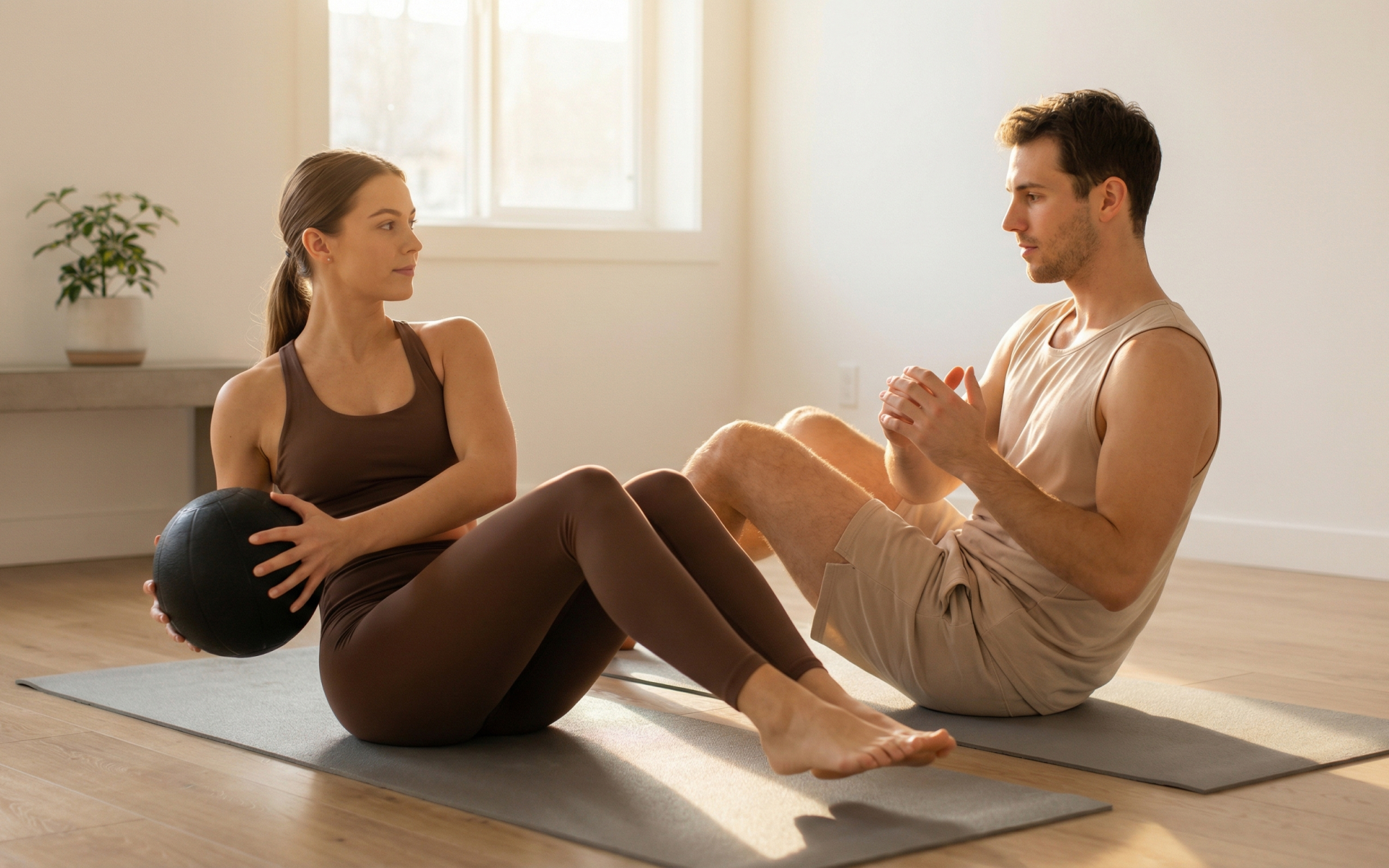Sweating your way through deadlifts and squats, or even a grueling HIIT workout at the crack of dawn hardly seems like the best way to start your day. What with the exhaustion, the huffing and puffing, and the unforgiving cold floor beneath your feet, it’s easy to question whether those early morning workouts are truly worth it. But as you wipe away the sweat and catch your breath, you might be surprised to discover the myriad of health benefits that come with a morning workout routine. From supercharging your metabolism to enhancing your mood for the day, there are 12 compelling reasons why breaking a sweat before breakfast could be one of the best decisions you make for your health. That said, before you hit the snooze button next time, consider these benefits and how they could transform your health and well-being.
Is Morning Gym Effective?
Yes, morning gym workouts are effective. The effectiveness of a workout is determined by its ability to help you meet your fitness goals, and a morning routine can do just that. It provides a consistent, uninterrupted time to exercise before the day’s responsibilities kick in.
Additionally, morning workouts align with our body’s natural rhythms, as hormones that aid in muscle building and fat-burning peak in the morning. This can lead to more efficient workouts and better results. However, individual preferences and lifestyles play a key role, and what works best for one person might not work for another.
Why Is It Better To Workout In The Morning?
Exercising in the morning can be a game-changer for your overall health and daily routine. It’s not just about getting it out of the way early, but also about taking advantage of our body’s natural rhythms.
Our bodies are primed to move in the morning, making it an optimal time to engage in physical activity. But that’s not all; let’s go beyond top 10 benefits of morning exercise in detail below:
You’ll Give Your Metabolism A Much-Needed Boost
Morning workouts can jumpstart your metabolism, allowing you to burn more calories throughout the day. This is due to a phenomenon known as Excess Post-Exercise Oxygen Consumption (EPOC), often referred to as the ‘afterburn effect’ (7).
After a workout, your body requires more oxygen to restore itself, which results in continued calorie burning even after you’ve finished exercising.
Starting your day with a high-intensity workout can maximize this effect, leading to increased metabolic activity for several hours afterwards. This is particularly beneficial for weight management and overall health.
You’ll Get Off To An Energetic Start
Exercising first thing in the morning can help increase your energy levels for the day ahead. During exercise, your body increases blood flow and oxygen supply to your muscles and brain, which can leave you feeling alert and energized.
Additionally, exercise stimulates the release of endorphins, neurotransmitters that create feelings of happiness and euphoria (22). These ‘feel good’ chemicals not only boost your mood, but also help combat fatigue, making you feel more awake and ready to tackle the day.
Read More: Benefits Of Barre Workout That Make It A Must-Try In 2023
Your Brain Function Will Improve
Regular morning workouts have been linked to enhanced brain function. Exercise promotes the growth of new brain cells and helps protect existing ones from degeneration (24). This can lead to improvements in various cognitive functions, including memory, attention, and problem-solving skills.
Furthermore, physical activity stimulates the release of brain-derived neurotrophic factor (BDNF), a protein that supports the health and growth of neurons (11). This can lead to enhancements in learning and mental acuity, making morning workouts a smart choice for your brain health.
You’ll Sleep Better At Night
Morning exercise can positively impact your sleep quality. Regular physical activity, particularly in the morning, can help regulate your body’s internal clock, or circadian rhythm. This can help you fall asleep faster, improve sleep quality, and increase sleep duration (14).
In addition, by exercising in the morning rather than later in the day, you avoid elevating your heart rate and body temperature close to bedtime, both of which can interfere with sleep.
Your Weight Management Will Be Easier
One of the widely cited benefits of working out in the morning for weight loss is that it may complement other efforts. Exercising in a fasted state forces your body to use its stored fat for energy, which can lead to greater fat loss (8).
And, as mentioned earlier, the afterburn effect of morning workouts can lead to increased calorie burning throughout the day. Combined with a balanced diet, this fasted morning workout benefits can be a powerful strategy for weight management.
Your Mood Will Improve
Exercise triggers the release of endorphins, the body’s natural mood boosters. These chemicals produce a sense of happiness and euphoria, often referred to as the ‘runner’s high’ (22). This mood-enhancing effect can set a positive tone for the rest of the day, helping to reduce stress and anxiety .
Regular workouts can therefore contribute to improved mental health and emotional wellbeing (6).
You’ll Promote Heart Health
Regular exercise is a proven way to reduce the risk of heart disease. It helps lower blood pressure, improve cholesterol levels, and enhance blood circulation (2).
By working out in the morning, you’re strengthening your heart and reducing the potential for cardiovascular disease. Plus, the consistency of a morning routine helps ensure that you’re getting the regular exercise needed for heart health.
Your Immune System Will Strengthen
Regular moderate morning exercise can boost your immune system (10). Physical activity helps flush bacteria out of the lungs and airways, reduces the chance of catching a cold or flu, and accelerates the circulation of white blood cells, which detect and attack foreign pathogens.
In essence, consistent morning exercise can make your immune system more efficient at identifying and responding to potential threats.
Looking for a way to break the vicious cycle of weight loss and tone up all the jiggly parts? Watch the extra pounds fly off and your muscles firm up with the BetterMe app!
Your Productivity Levels Will Increase
Starting your day with a workout can increase your productivity levels and is one of the best benefits of morning exercise for students and workers.
The increased blood flow to the brain enhances cognitive function, while the release of endorphins can improve mood and energy levels. This combination can lead to increased focus, alertness, and motivation, making you more efficient in your daily tasks.
You’ll Establish Healthier Eating Habits
Exercising in the morning can influence your dietary choices for the rest of the day.
Post-workout, you’re likely to reach for nutritious foods to refuel your body. This, coupled with the natural appetite-suppressing effect of exercise, can help control food cravings and promote healthier eating habits (23).
Your Skin Will Glow
Regular exercise enhances blood circulation, which carries oxygen and nutrients to skin cells, promoting their health and vitality (20). This increased blood flow also helps flush cellular debris out of the system, contributing to a clearer, healthier complexion. Morning workouts can therefore play a role in achieving that coveted healthy glow.
Your Bone Health Will Improve
Weight-bearing exercises like running, walking, or resistance training done in the morning can increase bone density and strength. They stimulate bone-forming cells and increase the uptake of calcium in the bones, reducing the risk of osteoporosis and fractures (9) (21).
By incorporating such exercises into your morning routine, you’re investing in your long-term bone health.
Early Morning Exercise Dangers
Exercising early in the morning can have multiple benefits, but there are also potential risks and drawbacks to be aware of. Here are some of the potential dangers associated with early morning exercise:
Low Blood Sugar (Hypoglycemia)
If you exercise intensely without eating breakfast, your body may not have enough stored glycogen to fuel your workout. This can lead to low blood sugar levels, causing symptoms such as dizziness, fainting, or even seizures.
To prevent this, consider having a small snack before your workout or sticking to moderate intensity exercise.
Increased Risk Of Injuries
Your body temperature is lower in the morning, which means your muscles may be stiffer. This could increase the risk of injuries like sprains and strains. A proper warm-up routine can help prepare your muscles for exercise and reduce this risk (25).
Higher Cortisol Levels
Cortisol, the stress hormone, is naturally higher in the morning (13). Intense exercise without proper recovery can further increase cortisol levels, potentially leading to negative effects like impaired immune function, poorer quality sleep, and increased belly fat storage over time (3) (17).
Read More: 16 Benefits Of Full-Body Workouts: What Can A Compound, Full-Body Workout Do For You?
Potential Sleep Disruption
If you have to wake up very early to fit in your workout, you might not be getting enough sleep. Chronic sleep deprivation is associated with numerous health issues, including impaired cognitive function, increased risk of cardiovascular disease, and weakened immune system (19).
Dehydration
Overnight, your body can become slightly dehydrated due to the long period without water. If you then engage in intense exercise without hydrating this could put strain on your body, especially your kidneys.
Cardiovascular Issues
Some studies suggest that the risk of heart attack or stroke is slightly higher in the morning, as blood pressure and clotting factors peak at this time (16).
While this risk is generally low, particularly for healthy individuals, those with existing cardiovascular issues should consult a doctor before starting an early morning exercise regimen.
Lower Performance
Some research indicates that physical performance may be lower in the early morning compared to later in the day, due to the body’s circadian rhythms (4). Therefore, if your goal is to improve performance or build strength, you might want to schedule your workouts for later in the day.
Is It OK To Workout 30 Minutes After Waking Up?
Yes, it’s perfectly fine to work out 30 minutes after waking up. Many fitness experts and trainers recommend it as a great way to kick-start your day. However, it’s important to listen to your body.
If you feel too stiff or groggy, you might want to give yourself more time to fully wake up and maybe do some light stretching before starting your workout. Also, if you’re planning a high-intensity workout, make sure to properly hydrate and consider eating a small snack to fuel your body.
Is It Ok To Workout In The Morning On An Empty Stomach?
Working out in the morning on an empty stomach, often referred to as fasted training, is a topic of ongoing debate among fitness and health experts.
The decision to do so largely depends on personal preference, your specific fitness goals, and how your body responds to exercising without eating beforehand.
If you tend to let yourself off the hook, raise the white flag when things get tougher than you expected, send yourself on an unconscious binge-eating trip – BetterMe app is here to help you leave all of these sabotaging habits in the past!
Potential Benefits Of Morning Workouts On An Empty Stomach
1. Enhanced Fat Burning
Some research suggests that fasted workouts might enhance fat burning, as the body turns to stored fat for energy when carbohydrate levels are low (12). This could potentially aid in weight loss.
2. Improved Metabolic Response
Fasted training could improve your body’s ability to switch between carbs and fat for fuel, enhancing metabolic flexibility. This can be beneficial for overall metabolic health.
3. Increased Growth Hormone Levels
Training on an empty stomach may lead to increased production of human growth hormone, which can facilitate fat burning and muscle growth (5).
Considerations And Drawbacks
1. Risk Of Muscle Loss
Exercising without eating first might increase the risk of muscle breakdown if your workout is too intense, as the body may turn to breaking down protein in muscles for energy.
2. Lower Energy Levels
Without readily available glucose from food, you might feel a lack of energy or intensity during your workout.
3. Potential Impact On Performance
If your workout involves high intensity or strength training, not eating beforehand could negatively impact your performance, as these types of exercise typically require a ready supply of glycogen (12).
Tips For Working Out On An Empty Stomach
Stay Hydrated
Ensure you drink plenty of water before and during your workout to stay hydrated.
Keep Intensity Moderate
If you’re exercising on an empty stomach, it might be best to stick to moderate-intensity activities like jogging, cycling, or swimming.
Listen To Your Body
Everyone’s body reacts differently to fasted training. Pay attention to how your body responds. If you feel dizzy, lightheaded, or excessively tired, it might be better to eat a small snack before working out.
Refuel After Your Workout
After your workout, make sure to consume protein to aid in muscle recovery and carbohydrates to replenish your glycogen stores.
Frequently Asked Questions
1. What Time Of Day Is Best To Workout?
The best time to workout is largely dependent on your personal schedule and preferences. Some studies suggest that the body performs best in the late afternoon or early evening, but if you’re a morning person, you might find it easier to stick to a morning routine (15).
The most important thing is to choose a time that fits into your schedule and is sustainable in the long run.
2. How Long Should A Morning Workout Be?
A morning workout can be as short as 20-30 minutes or as long as an hour or more. It really depends on your fitness goals and what you’re trying to achieve.
For general health and fitness, the American Heart Association recommends at least 150 minutes of moderate-intensity aerobic activity or 75 minutes of vigorous aerobic activity per week, ideally spread throughout the week (1).
3. Should I Eat Before A Morning Workout?
Whether or not you should eat before a morning workout comes down to personal preference. Some people feel energized by a light snack before a workout, while others prefer to exercise on an empty stomach, known as fasted training.
If you do choose to eat, aim for a small, easily digestible meal or snack around 30-60 minutes before your workout.
4. Can I Do Cardio After Waking Up?
Yes, you can certainly do cardio after waking up. In fact, many people find that doing cardio first thing in the morning helps them wake up and sets a positive tone for the day. Just make sure to warm up properly to avoid injury.
5. Can I Workout After Waking Up From A Nap?
Absolutely! As long as you feel alert and energized, working out after a nap can be a great way to get moving. However, it’s important to listen to your body. If you wake up feeling groggy or disoriented, it may be best to wait until you’re fully awake before starting your workout.
The Bottom Line
Morning workouts can significantly improve your health in numerous ways. From boosting metabolism and enhancing mood to promoting better sleep and improving cardiovascular health, the benefits are manifold. Incorporating a morning workout into your daily routine can be a game-changer for your overall well-being.
DISCLAIMER:
This article is intended for general informational purposes only and does not serve to address individual circumstances. It is not a substitute for professional advice or help and should not be relied on for making any kind of decision-making. Any action taken as a direct or indirect result of the information in this article is entirely at your own risk and is your sole responsibility.
BetterMe, its content staff, and its medical advisors accept no responsibility for inaccuracies, errors, misstatements, inconsistencies, or omissions and specifically disclaim any liability, loss or risk, personal, professional or otherwise, which may be incurred as a consequence, directly or indirectly, of the use and/or application of any content.
You should always seek the advice of your physician or other qualified health provider with any questions you may have regarding a medical condition or your specific situation. Never disregard professional medical advice or delay seeking it because of BetterMe content. If you suspect or think you may have a medical emergency, call your doctor.
SOURCES:
- American Heart Association Recommendations for Physical Activity in Adults and Kids (2018, heart.org)
- Cardiovascular Effects and Benefits of Exercise (2018. frontiersin.org)
- Central effects of stress hormones in health and disease: Understanding the protective and damaging effects of stress and stress mediators (2008, sciencedirect.com)
- Circadian Rhythms in Exercise Performance: Implications for Hormonal and Muscular Adaptation (2011, ncbi.nlm.nih.gov)
- Comparison of the effects of acute exercise after overnight fasting and breakfast on energy substrate and hormone levels in obese men (2015, ncbi.nlm.nih.gov)
- Effect of Time-of-Day-Exercise in Group Settings on Level of Mood and Depression of Former Elite Male Athletes (2019, mdpi.com)
- Effects of exercise intensity and duration on the excess post-exercise oxygen consumption (2006, pubmed.ncbi.nlm.nih.gov)
- Effects of Prior Fasting on Fat Oxidation during Resistance Exercise (2018, ncbi.nlm.nih.gov)
- Effects of Resistance Exercise on Bone Health (2018, ncbi.nlm.nih.gov)
- Exercise and the Regulation of Immune Functions (2015, sciencedirect.com)
- Exercise promotes the expression of brain derived neurotrophic factor (BDNF) through the action of the ketone body β-hydroxybutyrate (2016, ncbi.nlm.nih.gov)
- Exercise Training and Fasting: Current Insights (2020, ncbi.nlm.nih.gov)
- Interactions between sleep, stress, and metabolism: From physiological to pathological conditions (2015, ncbi.nlm.nih.gov)
- Interrelationship between Sleep and Exercise: A Systematic Review (2017, hindawi.com)
- Morning and evening exercise (2013, sciencedirect.com)
- Morning Surge in Blood Pressure and Cardiovascular Risk (2010, ahajournals.org)
- Novel insights of overtraining syndrome discovered from the EROS study (2019, ncbi.nlm.nih.gov)
- Regulation of Muscle Glycogen Repletion, Muscle Protein Synthesis and Repair Following Exercise (2004. ncbi.nlm.nih.gov)
- Role of sleep deprivation in immune-related disease risk and outcomes (2021, nature.com)
- The association between activity levels and skin moisturising function in adults (2021, ncbi.nlm.nih.gov)
- The Effectiveness of Physical Exercise on Bone Density in Osteoporotic Patients (2018, hindawi.com)
- The Effects of Acute Exercise on Mood, Cognition, Neurophysiology, and Neurochemical Pathways: A Review (2017, ncbi.nlm.nih.gov)
- The influence of 15-week exercise training on dietary patterns among young adults (2019, nature.com)
- The Neuroprotective Effects of Exercise: Maintaining a Healthy Brain Throughout Aging (2018, ncbi.nlm.nih.gov)
- Warm-up and stretching in the prevention of muscular injury (2007, pubmed.ncbi.nlm.nih.gov)












